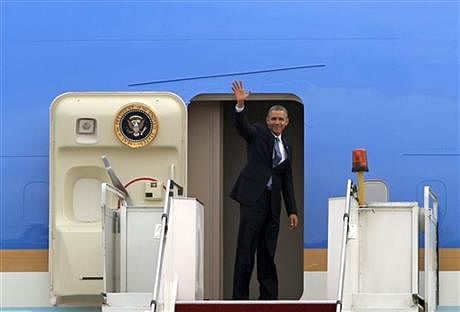Obama fails to seal Trans-Pacific Partnership deal
Obama fails to seal Trans-Pacific Partnership deal

No deal. This best sums up United States President Barack Obama’s stops in Japan and Malaysia, where bilateral Trans-Pacific Partnership (TPP) trade negotiations failed to end in an agreement.
Clinching a deal with Japan, even an in-principle one, topped Obama’s agenda here last week, at the start of a four-nation Asia tour to reassure allies of US commitment to the region.
When the President arrived at Tokyo’s Haneda airport last Wednesday evening, sushi was the furthest thing from his mind.
Whisked directly from the airport to arguably the best sushi bar in town, where host Prime Minister Shinzo Abe was waiting, Obama got straight down to business, segueing into their two countries’ deadlocked TPP talks after touching on their mutual security alliance.
He told Abe that by working together on TPP, the two nations would “show leadership in the region”. But that was not enough to make Abe give in.
The Japanese had reportedly picked a sushi bar for dinner in a bid to put Obama’s mind off beef, pork and other farm products whose markets the Japanese hold sacrosanct, but to which the Americans want access. However, not only did Mr Obama not finish the 30,000 yen (US$293) sushi course, but he was also in no mood for small talk either.
“It was a TPP business dinner. The President didn’t crack any jokes,” Abe let on to his aides after what was supposed to have been an opportunity to bond with the US leader.
After dinner, the two leaders instructed their officials to meet again to strive for a deal.
Negotiations continued on and off until an hour before Obama’s departure for Seoul last Friday morning and the joint statement for the leaders’ meeting was finally released. But there was no cheer for Obama, who got only an agreement from Japan to continue the TPP talks.
With the two largest economies in the 12-nation TPP group failing to achieve a real breakthrough, negotiations for the entire group are likely to be further delayed, putting in doubt the chance of a final accord by the end of this year.
Both the US and Japan have little time to lose. TPP countries are due to meet in Vietnam next month for another round of talks.
There was disappointment as well in Kuala Lumpur for Obama, who received only a commitment from Prime Minister Najib Razak yesterday to resolve “remaining issues” in their bilateral TPP negotiations.
Pro-Malay groups fear that the TPP would undermine Malaysia’s affirmative action policy, especially in government procurement, which favours bumiputera-owned companies, while civil society groups are concerned that essential goods such as medicines will be priced beyond the reach of the poor.
The Americans had hoped for an early deal with Japan in order to win over Obama’s detractors in his Democratic Party.
With US mid-term elections due in November, the President is also under pressure to open market access for American farmers and carmakers to Japan.
Abe, on the other hand, was no doubt elated at having successfully held off the Americans.
Agreeing to give access to US farm and auto products on American terms would have angered Abe’s supporters, especially the rural constituencies that are deeply suspicious of his intentions.
The Japanese also knew they risked nothing by not giving in, as they were aware that Obama does not have an entirely free hand.
Unwittingly revealing the Japanese thinking, Deputy Premier and Finance Minister Taro Aso told reporters: “At present, Obama is incapable of getting a domestic consensus. Even if we strike a deal, there is no guarantee Congress will approve it.”
For Obama does not have “fast track authority” to negotiate a trade agreement that the US Congress can only approve or disapprove but cannot amend, making it that much harder for him to forge any deal with the Japanese.
But senior US administration officials claim much ground was covered in Tokyo.
Said Ben Rhodes, deputy national security adviser for strategic communications: “Together, the United States and Japan have identified a path forward to deal with our bilateral issues in the negotiations that will also give momentum for the regional negotiations.”
But Japanese trade minister Akira Amari was less sanguine, telling local reporters that while some gaps were narrowed, there was no agreement.
“If I were offered the same portfolio again, I would not want to do it,” said Amari, hinting that his US counterpart, Trade Representative Michael Froman, had been very tough with him.
Even if both sides, as they claim, have considered such elements as the framework and timetable for tariff cuts for each item, and what volume of imports is acceptable, striking a deal on all the details could take a lot of time.
Copyright: The Straits Times/ Asia News Network